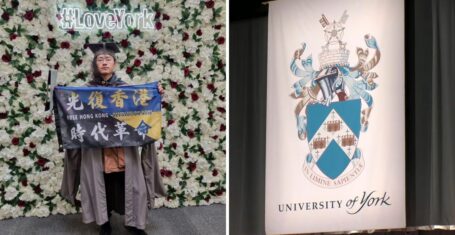
Revealed: University of York receives £4 million in funding from weapons manufacturers
The University won’t tell us how they spend the money
The University of York has received over £4 million in the past five years in research funding and fees from arms companies that have been “implicated in human rights abuses around the world.”
A number of organisations have criticised the University’s dealings with arms companies, however, University management have responded to backlash saying funding passed ethics committee standards.
BAE are profiting from bombing civilian targets in Yemen
The Tab can exclusively reveal that four arms companies including BAE and Rolls-Royce have poured £4,308,690.01 into several university departments, including computer science and chemistry over the past five years.
A Freedom of Information request shows that the university received an eye-watering £1.8 million in 2010/11 for ‘research funding, industrial consultancy fees, and industrial research fees’. The amount received has decreased in subsequent years, but has still remained at around the £500,000 mark, and was £517,613.30 in 2014/15.
YUSU President Ben Leatham has commented that, “The amount of investment from arms companies into research grants at York is concerning” and has called for the University to show greater transparency with regards to their funding. He has however warned against making assumptions based on the revelations:
“Before jumping to any conclusions I think it would be important to look into the nature of the grants to find out exactly what is being funded. I encourage the University to release details of these grants to allow for a healthy discussion to take place. Students should be free to form their own opinions based off this information.”
[infogram id=”8ec364ff-87ea-430e-8538-e7532f334836″ prefix=”dY2″ format=”interactive” title=”Untitled chart”]
BAE, the world’s third largest arms producer, who’s fighter jets have been used in the Saudi-led bombing of Yemen, have contributed 76% of the funds given by arms companies, including a whopping £1.5 million in 2010/11.
A number of global investigations into BAE have taken place. In February 2010, BAE were forced to pay $400 million in fines to the US after admitting to “defrauding the US” over the sale of fighter planes to Saudi Arabia and Eastern Europe. They also reached a £30 million settlement with the Serious Fraud Office concerning failure to keep accounting records in Tanzania.
Raytheon, who have also given money to the University, is the world’s fourth largest arms producer and is the largest manufacturer of guided missiles worldwide.
[infogram id=”af5a9259-3569-43a6-a352-40e53f8b56da” prefix=”pJ5″ format=”interactive” title=”Untitled chart”]
The Computer Science Department has received the lion’s share of the money, over £1.3 million, while the Physics Department jumped to defend the £100,000 they received saying, “the contracted work was to improve the detection of illicit explosives and drugs.”
[infogram id=”06441034-5df7-4c86-9010-6647ec9c8bee” prefix=”Icl” format=”interactive” title=”Research Grants – Department”]
A number of organisations moved to condemn the university’s links to arms companies. Dr Stuart Parkinson of Scientists for Global Responsibility told The Tab:
“The UK’s military and arms companies are involved in a range of very controversial activities, including deploying nuclear weapons, exporting arms to governments with poor human rights records, and involvement in wars in the Middle East.”
“Universities could and should be helping to build a more peaceful world, and an important way of doing this would be to sever ties with organisations involved in such activities.”
BAE, QinetiQ, Raytheon and Rolls-Royce are the four companies listed in the FOI, and have applications to supply military equipment to 11 out of 27 countries on the Home Office’s black list of countries that have poor human rights records, which include Afghanistan, Iraq, Israel, Libya, Saudi Arabia and Pakistan.
The Tab has traced York’s relationship with arms companies back to 2001, with Nouse reporting in 2008 that the University had accepted £7.7 million between 2001-2006, and reporting again in 2011 that the University had received a further £4 million between 2008-2011.
Following Nouse’s investigations in 2011, students protested across campus. The demonstration itself featured a talk from the MP for York Central, Sir Hugh Bayley, yet five years on, nothing has changed.
Protests at the University of York in 2011. Credit: Philippa Grafton
David Duncan, University Registrar and Secretary, responded to concerns raised over the university’s links with the arms trade:
“The University does not have a blanket ban on accepting research grants from companies which are involved in the defence sector. However, all research grant applications are routinely peer reviewed under our departmental ethics committee structure.”
Duncan’s response has been replicated almost word for word by the Heads of the Chemistry, Computer Science, and Physics departments when asked for comment.
Strikingly similar
The Tab contacted the university’s ethics committee asking why they had allowed the university to receive research grants from arms companies, but they did not respond.
The University’s 2014-2020 strategy states: “We apply the highest ethical standards to all our activities and want to make a positive contribution to the development of a fairer and sustainable world.”
However, Kat Hobbs of Campaign Against Arms Trade told The Tab:
“Universities should never accept research grants from arms companies. These research projects help arms companies to ensure that certain military research is done, boosting their business, while ensuring that good links are maintained with universities and that there are lots of students willing to work for them.”
“It’s a great PR move for arms companies, allowing them to present themselves as legitimate businesses, despite their weaponry being implicated in human rights abuses around the world.”
Last October, the Palestinian Society protested against arms manufacturers being allowed to attend the Technology Careers fair, creating an online petition and calling for the end to all research that is funded by arms companies and the introduction of compulsory ethics modules in engineering and computer science degrees.
Habib Nassar, a third year Electronics student and co-ordinator of the student-led group Disarm York has spoken out about the Tab’s revelations:
“The university’s involvement with these companies intrinsically links students’ degrees with unethical practices.”
“The university has a social responsibility to fulfil and having links with arms companies who sell their products to human rights abusers around the world definitely doesn’t fit into that. As students, we are calling for our university to contribute more positively towards society and the world as a whole, as well as taking an active stance against human rights abuses.”
Nassar, who came a close second in this year’s race for YUSU President, has also called for further transparency from the University.
He added: “I believe that students should have a say in whether they want the university to receive money from such companies or whether they want their research projects funded by them.”
“Students also have a right to know what they will be contributing towards if they take up a career with such arms companies. Careers with these companies shouldn’t just be advertised to students as excellent work opportunities with no ethical implications attached. As an electronics student myself, I know that there is definitely not enough time to research the hundreds of companies presented to us by our department and the university’s Careers service.”
In an investigation carried out by the Huffington Post in 2012, 18 out of the 24 universities that responded stated that they received funding from arms companies. Only one, the London School of Economics, said it received no such funds, showing the endemic nature of the relationship between higher education institutions and weapons manufacturers.
Without a response from the ethics committee about how decisions on funding are made, or details from departments about how the money is spent, students and staff are left in the dark. This gives cause for suspicion and further transparency is needed for allowing those at the University of York to form their own opinion on the issue.









































